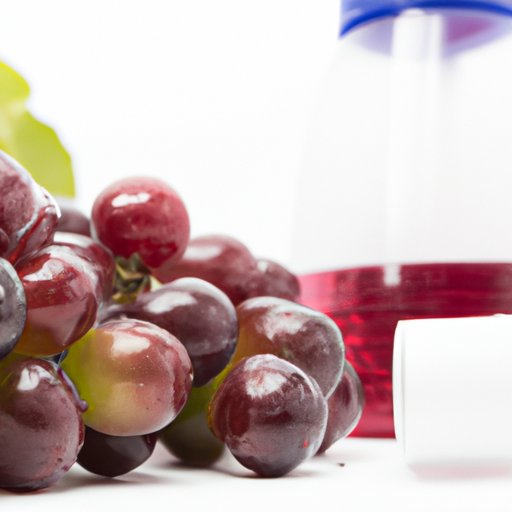
The Ultimate Guide on How to Clean Grapes for Maximum Safety and Enjoyment
Grapes are one of the most popular fruits around the world; they are delicious and nutritious, packed with vitamins, fiber, and antioxidants. However, like all fresh produce, grapes can harbor dirt, bacteria, and unwanted substances that could be harmful to our health. That’s why it’s crucial to wash grapes thoroughly before eating them. But, what if you’re not sure of the right way to clean your grapes? Don’t worry, in this article, we’ll show you the basics and explore several other methods to clean grapes effectively.
The Basic Method
The simplest and most common way to clean grapes is to rinse them under running water and then drain them in a colander or strainer. Here’s how to do it:
- Place the grapes in a colander or strainer, making sure they are not piled high.
- Hold the colander under running water and gently wash each grape, rubbing them between your fingers to remove any dirt or residue.
- Repeat the process until all the grapes are clean.
- Shake off the excess water and let the grapes dry before eating or storing.
Although this method is simple and straightforward, there are a few common mistakes people make when washing grapes. For instance, some people dump all the grapes into the sink and let them soak before washing them. This is not recommended as it can lead to waterlogging and the fruits could absorb harmful chemicals or bacteria from the sink. Others may not wash their hands before cleaning the grapes, introducing more dirt and bacteria into the process. So, be careful and keep things simple.
Vinegar Soak
If you want to boost the effectiveness of your grape cleaning method, consider using a vinegar solution. Vinegar has acetic acid, which can help kill bacteria and remove pesticides and other unwanted substances from grapes. Here’s how to do it:
- Fill a large bowl or basin with cold water and add 1 cup of white vinegar per 4 cups of water.
- Place the grapes in the solution and swish them around gently to distribute the vinegar solution around them.
- Let them soak for about 5-10 minutes.
- Rinse the grapes under running water and drain them in a colander to remove any vinegar residue.
- Let them dry before eating or storing.
While vinegar is safe and effective, be careful not to use too much, or the grapes could end up tasting sour or too acidic. Also, rinse thoroughly with water after soaking, as leftover vinegar could irritate your skin or mucous membranes.
Baking Soda Scrub
If soaking isn’t your style, consider giving your grapes a good scrub-down with baking soda. Baking soda is mildly abrasive and can help remove stubborn dirt and unwanted substances from your grapes. Here’s how to do it:
- Fill a bowl with water and add 1-2 teaspoons of baking soda per cup of water.
- Dip your grapes in the solution and rub them gently for about 2-3 minutes.
- Rinse your grapes under running water to remove any baking soda residue.
- Drain them in a colander and let them dry before eating or storing.
Although baking soda is safe and won’t harm your grapes, some readers may worry about a residual aftertaste or scent. However, if you rinse thoroughly, this should not be an issue.
DIY Fruit Wash
For those who prefer all-natural methods or wish to save some money, there are many home recipes for a DIY fruit wash. Home fruit washes typically consist of natural ingredients such as salt, vinegar, lemon juice, or baking soda, that are known for their antibacterial or cleaning properties. Here are two of our favorites:
- Saltwater wash: Mix 4 teaspoons of salt with 3 cups of water and rinse grapes in the solution for 30 seconds before rinsing with clean water.
- Lemon wash: Mix equal parts of lemon juice and water and soak grapes for about 5 minutes. Rinse with clean water and let them dry before eating.
Feel free to experiment with different combinations of natural ingredients and find what works for you. However, remember to rinse thoroughly with clean water to remove any residual taste.
Using a Commercial Produce Cleaner
If you don’t have time for a vinegar soak or a DIY wash but still want to be certain your grapes are clean, consider using a commercial produce cleaner. These cleaners are readily available in most food stores or online and come in various types, including sprays, wipes, and foams. Some of the best products on the market include:
- Fit Organic Fruit and Vegetable Wash
- Earth Friendly Products Fruit & Vegetable Wash
- Veggie Wash Natural Fruit & Vegetable Wash
Always read the instructions and follow the safety guidelines before using a commercial cleaner on your grapes. Some people may be allergic to certain chemicals or fragrances, so be sure to check the ingredients list carefully.
Conclusion
Cleaning grapes before eating them is an essential step in ensuring your safety and enjoyment as a consumer. As we have seen, there are several ways to clean your grapes, from the basic water rinse to more advanced methods involving vinegar, baking soda, and commercial cleaners. Whether you prefer a natural DIY approach or a commercial product, the most important thing is to follow proper procedures and be diligent about food safety. With a little effort and the right tools, you can always have clean, healthy, and delicious grapes to snack on.




